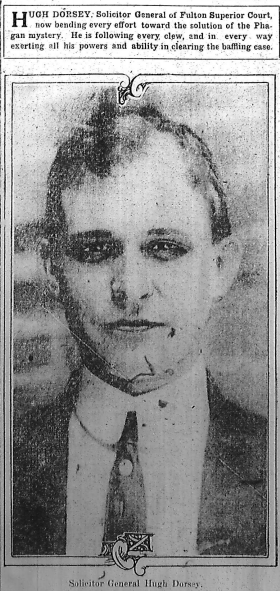 Another in our series of new transcriptions of contemporary articles on the Leo Frank case.
Another in our series of new transcriptions of contemporary articles on the Leo Frank case.
Atlanta Georgian
Tuesday, May 6th, 1913
By A GEORGIA LAWYER.
It is absurd to say, as some people have been saying in Atlanta of late, that Solicitor General Dorsey “has taken the Phagan case from the Coroner,” or has “butted in” on the Coroner’s business in some way.
It would be equally sensible to say that the commanding general in a battle had “butted in” on a captain’s business, when, as the battle progressed, the general gave directions of one sort and another to the captain as to its conduct.
The truth of the matter is, Solicitor General Dorsey has been in charge of the Mary Phagan case ever since it was brought to light.
Murder is a crime against the sovereign State, and not particularly against either the city of Atlanta or the county of Fulton, save in so far as they are a part of the State.
A murder in Atlanta is as much Savannah’s business as it is Atlanta’s so far as the violation of the laws of Georgia are concerned.
Solicitor Dorsey is a State official, and not specifically an Atlanta official, not yet a Fulton County official.
Office Useless in Main.
For certain purposes a Coroner’s inquest sometimes is permitted under the law prior to Grand Jury investigation. Many lawyers hold, and rightly, that the office of Coroner is useless in the main, and ought to be abolished. It is a relic of old English procedure, instituted before the days of newspapers, telephones, telegrams, fast mails and other quick methods of communication.
In the absence of eyewitnesses to an apparent murder, however, a Coroner’s inquest sometimes may serve an immediate purpose, and, perhaps, the Phagan case is a case in point with regard to that.
The Coroner is an officer entirely and definitely subordinate to the Solicitor General, and does not exercise any authority except such as he may exercise under the Solicitor.
The Solicitor assembles, in his discretion, the evidence against the accused, from it makes out a case for the Grand Jury, advises and instructs the Grand Jury as to its duty and rights in the matter, prepares an indictment for the Grand Jury’s consideration, which, if found true, must be depended upon to set forth the case against the defendant to be summoned to bar in such exact terms that it may be guaranteed to withstand all attacks of opposing counsel in the trial of the case.
Has Full Responsibility.
The initial and the final responsibility for the State’s case is in the hands of the Solicitor General.
There never is a minute from the time a murder is committed until a verdict is recorded that the State’s cause is not in the hands of the Solicitor General, over and above all other officers.
He can not take a murder case “from the hands of a Coroner,” because there never was a point of time in any murder case’s history that it was not more in the hands of the Solicitor than it possibly could have been in the hands of the Coroner.
No man may be put in jeopardy of his life a second time in Georgia (save of his own motion) in criminal proceedings, but the “verdict” of a Coroner’s jury can not be pleaded as former jeopardy.
Policemen, Coroners, Sheriffs are all peace officers, and have their direct and indirect duties to perform in the presence of crime against the State, but never is there a time when any one of them is equal in dignity or authority to the Solicitor General.
There is but one trial, upon motion of the State, of a criminal case in Georgia, and that is in the court house, under the direction of the Solicitor.
If a defendant be acquitted, that ends the matter. If he be convicted, he may move for another trial or appeal to a competent court of review. The State has no appeal.
Therefore, the law very properly provides that Coroner’s findings, committal hearings and Grand Jury returns shall be merely parts of the process employed, or permitted, by the Solicitor, in whole or in part, prior to the actual trial of a case in the court house, before the judge and the trial jury.
There never is any question of the Solicitor General’s supreme prosecuting status in the progress of a criminal investigation. Within the wide and sometimes arbitrary scope of his office he stands first in responsibility as the State’s accredited representative and agent in the prosecution.
To be sure, there are Constitutional and statutory curbs and restrictions upon a Solicitor General, but none of them may be invoked by a Coroner.
* * *
Atlanta Georgian, May 6th 1913, “Phagan Case and the Solicitor General’s Power Under Law—Dorsey Hasn’t Encroached on Coroner,” Leo Frank case newspaper article series (Original PDF)